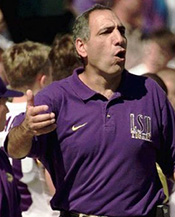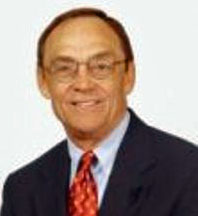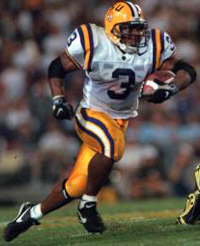LSU Short Story
Scott Rabalais, The Fighting Tigers 1993-2008: Into a New Century of LSU Football (2008)
LSU had just won the 1997 Independence Bowl, their third bowl victory in the three years of Gerry DiNardo's tenure as head coach.
LSU had just won the 1997 Independence Bowl, their third bowl victory in the three years of Gerry DiNardo's tenure as head coach.
As the new year beckoned, there was every reason to believe the Tigers were back, and ready to scale even greater heights.
With a 26-9-1 record the previous three seasons, LSU was winning consistently again. Recruiting was strong. Although some top prospects like Travis Minor and Thomas Pittman had slipped away, others such as Kevin Faulk and Cecil Collins had stayed home. At the top of it all was Gerry DiNardo, now entrenched as LSU football's leader and comfortable enough to put down roots. ...
But even as LSU fans basked in the afterglow of defeating Notre Dame in the Independence Bowl and excitement for the new season built month by month, there were troubling clouds on the horizon. Before the bowl, defensive coordinator Carl Reese left for a similar position at Texas, ending a seven-year coaching run with DiNardo. Their working relationship had cooled when DiNardo took a more hands-on approach to the defense after the 36-21 upset loss to Ole Miss in 1997. Whoever was in charge, LSU had led the SEC in scoring defense for the second time in the last three seasons. To replace Reese, DiNardo hired Lou Tepper, dismissed as head coach at Illinois in 1996 after his third nonwinning season in five with the Illini. They had coached together in Colorado, and DiNardo was eager to fit a familiar hand into his program. He had a vision of doing things the LSU way.
"I didn't want this to be a coordinator-based program," DiNardo explained. "I wanted it to be the LSU offense and the LSU defense. Whether it was Carl Reese or Lou Tepper or Morris Watts, I wanted to be facilitator.
"Was it the right decision? Maybe not. But it wasn't a whim. It was the opposite of ego driven. I said, 'Let's make this about LSU.'"
Tepper may have been brought in to run the LSU defense the LSU way, but he had changes in mind. During his coaching exile after leaving Illinois, he wrote a book called Complete Linebacking. In it, he described a position that would become infamous to LSU fans: the drop linebacker. A utility position designed to stop the pass, support the run, press the tight end, and guard the flats near the sideline, it accomplished none of those objectives well at LSU. At the time, though, it was part of Tepper's plan to switch LSU from Reese's 4-2-5 to a 3-4 base formation. The change would require more linebackers, drop or otherwise. "We will find some linebackers," Tepper promised.


L-R: Gerry DiNardo, Lou Tepper, Kevin Faulk
During Independence Bowl week, word came that Faulk was considering leaving school to turn pro. He wrestled with his decision for a couple more weeks before announcing he would return to LSU. "It's just that I wasn't ready to leave," Faulk said the day he made his announcement. "I love it here." LSU fans everywhere rejoiced, many glossing over the fact that Faulk was losing his best blocker - All-American G Alan Faneca - who was leaving early for the draft. But senior QB Herb Tyler, 23-5 as a starter, was also returning. So were RB Rondell Mealey; Larry Foster and Abram Booty at receiver; Anthony McFarland, Mark Roman, and Raion Hill on defense. And then there was talented, star-crossed TB Cecil Collins, healed from the broken leg and dislodged ankle ligaments that sidelined him in the 1997 Vanderbilt game.
Physically, Collins may have recovered, but there was plenty of heartache ahead. In June 1998, Collins was arrested for forcing his way into an apartment near the campus and fondling a 17-year-old woman ... The next day, DiNardo dismissed him from the team. In July, Collins was arrested on a similar charge. "He challenges what the game is supposed to be," DiNardo said. "Every coach has a breaking point. I went as far as I could." Collins transferred to McNeese State, where he played two games before failing a drug test, getting kicked off the team, and landing in jail. He eventualy was drafted in the fifth round in 1999 by the Miami Dolphins. Again a rising star, Collins suffered another broken leg, then was arrested for illegally entering a neighbor's South Florida apartment and was sentenced to fifteen years in prison.
"He was high maintenance from the beginning," DiNardo said. "He was the opposite of Kevin Faulk. Drug tests, high school problems, a relationship with his mother that showed a lack of respect. We knew what we were getting into. But does the head coach at LSU turn down the best prospect in the state? Lose him in a recruiting battle and you're called a bad recruiter. Don't recruit him and you're dumb."
The Chinese calendar said 1998 was the Year of the Tiger. Instead, 1998 felt a lot like 1986, the year encapsulated by the Sports Illustrated headline "Crazy Days at LSU." Not only was Collins dismissed, but so was teammate Chris Beard for violating unspecified team rules. Track coach Pat Henry accused DiNardo of making sprinter and WR Chris Cummings participate in spring practice with an injured knee. DiNardo didn't address the charge, but left the impression that he who provides the scholarship (DiNardo) makes the rules. ...
And yet nothing was expected to derail the LSU football express. When the preseason polls were released, LSU started at No. 9, and the SEC football media again installed the Tigers as the favorite to win the SEC West.
Instead the Tigers finished 4-7, 2-6 in the SEC. When they won only two of their first ten games in '99, DiNardo was fired before the season finale against Arkansas. Assistant Hal Hunter took over and led LSU to a 35-10 rout of the #17 Razorbacks.
LSU hired Nick Saban from Michigan State to lead the program into the 21st century.
With a 26-9-1 record the previous three seasons, LSU was winning consistently again. Recruiting was strong. Although some top prospects like Travis Minor and Thomas Pittman had slipped away, others such as Kevin Faulk and Cecil Collins had stayed home. At the top of it all was Gerry DiNardo, now entrenched as LSU football's leader and comfortable enough to put down roots. ...
But even as LSU fans basked in the afterglow of defeating Notre Dame in the Independence Bowl and excitement for the new season built month by month, there were troubling clouds on the horizon. Before the bowl, defensive coordinator Carl Reese left for a similar position at Texas, ending a seven-year coaching run with DiNardo. Their working relationship had cooled when DiNardo took a more hands-on approach to the defense after the 36-21 upset loss to Ole Miss in 1997. Whoever was in charge, LSU had led the SEC in scoring defense for the second time in the last three seasons. To replace Reese, DiNardo hired Lou Tepper, dismissed as head coach at Illinois in 1996 after his third nonwinning season in five with the Illini. They had coached together in Colorado, and DiNardo was eager to fit a familiar hand into his program. He had a vision of doing things the LSU way.
"I didn't want this to be a coordinator-based program," DiNardo explained. "I wanted it to be the LSU offense and the LSU defense. Whether it was Carl Reese or Lou Tepper or Morris Watts, I wanted to be facilitator.
"Was it the right decision? Maybe not. But it wasn't a whim. It was the opposite of ego driven. I said, 'Let's make this about LSU.'"
Tepper may have been brought in to run the LSU defense the LSU way, but he had changes in mind. During his coaching exile after leaving Illinois, he wrote a book called Complete Linebacking. In it, he described a position that would become infamous to LSU fans: the drop linebacker. A utility position designed to stop the pass, support the run, press the tight end, and guard the flats near the sideline, it accomplished none of those objectives well at LSU. At the time, though, it was part of Tepper's plan to switch LSU from Reese's 4-2-5 to a 3-4 base formation. The change would require more linebackers, drop or otherwise. "We will find some linebackers," Tepper promised.



L-R: Gerry DiNardo, Lou Tepper, Kevin Faulk
Physically, Collins may have recovered, but there was plenty of heartache ahead. In June 1998, Collins was arrested for forcing his way into an apartment near the campus and fondling a 17-year-old woman ... The next day, DiNardo dismissed him from the team. In July, Collins was arrested on a similar charge. "He challenges what the game is supposed to be," DiNardo said. "Every coach has a breaking point. I went as far as I could." Collins transferred to McNeese State, where he played two games before failing a drug test, getting kicked off the team, and landing in jail. He eventualy was drafted in the fifth round in 1999 by the Miami Dolphins. Again a rising star, Collins suffered another broken leg, then was arrested for illegally entering a neighbor's South Florida apartment and was sentenced to fifteen years in prison.
"He was high maintenance from the beginning," DiNardo said. "He was the opposite of Kevin Faulk. Drug tests, high school problems, a relationship with his mother that showed a lack of respect. We knew what we were getting into. But does the head coach at LSU turn down the best prospect in the state? Lose him in a recruiting battle and you're called a bad recruiter. Don't recruit him and you're dumb."
The Chinese calendar said 1998 was the Year of the Tiger. Instead, 1998 felt a lot like 1986, the year encapsulated by the Sports Illustrated headline "Crazy Days at LSU." Not only was Collins dismissed, but so was teammate Chris Beard for violating unspecified team rules. Track coach Pat Henry accused DiNardo of making sprinter and WR Chris Cummings participate in spring practice with an injured knee. DiNardo didn't address the charge, but left the impression that he who provides the scholarship (DiNardo) makes the rules. ...
And yet nothing was expected to derail the LSU football express. When the preseason polls were released, LSU started at No. 9, and the SEC football media again installed the Tigers as the favorite to win the SEC West.
Instead the Tigers finished 4-7, 2-6 in the SEC. When they won only two of their first ten games in '99, DiNardo was fired before the season finale against Arkansas. Assistant Hal Hunter took over and led LSU to a 35-10 rout of the #17 Razorbacks.
LSU hired Nick Saban from Michigan State to lead the program into the 21st century.